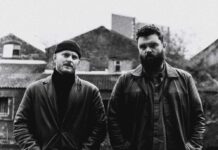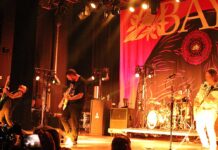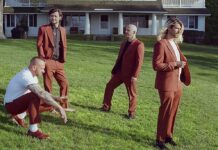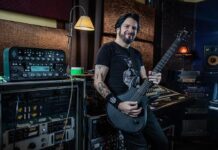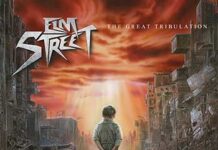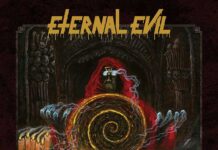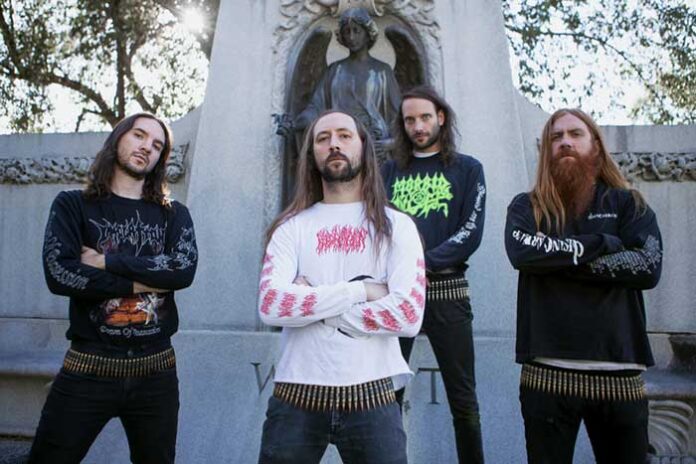
INTERVIEW WITH ISAAC FAULK, JEFF BARRETT, MORRIS KOLONTYRSKY, AND PAUL RIEDL BY KEVIN STEWART-PANKO
PHOTOGRAPH BY ALVINO SALCEDO
Denver, Colorado space worshipping death metal nerd-niks, Blood Incantation are a transcriber’s worst nightmare. For the occasion of their EP (or album, as you’ll soon discover) Timewave Zero, the quartet of drummer Isaac Faulk, bassist Jeff Barrett, guitarist Morris Kolontyrsky, and guitarist/vocalist Paul Riedl insisted on all being present in order to give an update in the latest happenings in their world. That’s all well and good, until you realize that Blood Incantation’s shared musical umbilical cord and creative same brain goes well beyond the artistic page they’ve existed on since forming in 2011.
In addition to their communal love of vegan cuisine, classic Simpsons episodes, and penchant for spending ridiculous amounts of money on records, the four dudes almost speak as one, finishing each other’s thoughts and sentences, cutting into and talking over one another to extrapolate on points already floating in the conversational ether. It’s like their split brain musical language and outside interests decided to forge forward with bullet train speed and accuracy. It’s like slick and calculated fragmentation of the Sklar Brothers comedy duo dropped a bunch of ‘shrooms and acid before getting hooked on Morbid Angel and Tangerine Dream.
It seems that journalists aren’t the only folks being thrown for a loop by Blood Incantation. Timewave Zero pulls the emergency brake on the cosmic, psychedelic, oblong death metal they have come to prominence with their two full-lengths, Starspawn and Hidden History of the Human Race, and leaps head first into an experiment with progressive, avant-garde Krautrock that the quartet is referring to as “our ambient record.” The EP (or album, we promise, you’ll soon discover) consists of two 20 minute long songs and a bonus improv track that’s longer than either of the songs from the main program, with a Blu-ray version of the release that includes video accompaniment. Safe to say, the lines are curved, if not entirely blurred, in the world of Blood Incantation, and we caught up with the band to help us make sense of it all.
Why take a detour in the form of an ambient record? Especially at this stage of the game, as you’re still growing yourselves as a death metal entity?
Faulk: That’s probably the exact reason why we chose to do it.
Riedl: I don’t even see it as a detour. I see it as a methodical next step where it’s a fulfillment of the proposed initial concept.
Barrett: It’s an embellishment.
Riedl: Everyone is, “Oh, they have these space ambient atmospheric parts, these interludes, these acoustic parts.” On our first record, the most brutal song title is an instrumental atmospheric classical piece with synths in the background. We did the same thing on our last record. The first recorded sound on any of our demos was a singing bowl and a synthesizer percolating up to the first track on Interdimensional Extinction. Is it a detour? How could it be a detour if the first recorded sound in a studio that Blood Incantation ever released was a singing bowl and synth?
Those elements are part of what you’ve done up until now, but to do it all exclusively in one package is very different than having it as intros and interludes on a very death metal album.
Morris Kolontyrsky: But that’s why it’s only an EP.
“THERE’S BEEN SO MUCH BRUTALITY AND INSANE RIFF AFTER RIFF, AND THAT WILL HAPPEN AGAIN ON THE NEXT METAL RECORD, WHICH WILL PROBABLY BE MORE INSANE, BUT IT GIVES PEOPLE SOME TIME TO REFLECT ON THAT IN A NEW WAY WITH THIS OFFERING.”
It’s also an EP that’s longer than either of your albums.
Faulk: Someone recently posted something saying that we’re just trolling everybody.
Kolontyrsky: It’s a palate cleanser for us and for the fans. There’s been so much brutality and insane riff after riff, and that will happen again on the next metal record, which will probably be more insane, but it gives people some time to reflect on that in a new way with this offering. Furthermore, this is the first time in the history of the band where we don’t have riffs to live up to or ideas we wanted to incorporate into a new record because it’s a clean slate. We’ve achieved every step of the goal that we’ve made as far back as 2012-13.
Faulk: It’s a capstone on everything we’ve done up to this point, because we have been going further and further more progressive and further away from that strict old school death metal thing. Doing this is like a bridge of the gap in a way. It didn’t make sense for us to come out of this situation with a new metal record, especially because we haven’t really had the chance to tour Hidden History.
Riedl: It sucks to have gone through what is now three calendar years, but it came out at the end of 2019. In 2020, there were no tours to capitalize on. In 2021, we got a little bit out there and played the most shows for it, which has been a three week tour and three or four fly out shows for an album that was infinitely more successful and further reaching than the record before, which we did 11 tours on. We need a chance to get this music out to the people because they’ve been listening to it on YouTube or whatever for two years.
Kolontyrsky: And we’ve also only ever done two European tours.
Faulk: And also, it’s for us. Doing these tours isn’t just for the fans. When we tour our albums, it makes us better and we learn how to do what we do best, better. We didn’t have that chance. We would have made the ambient record regardless, but it gave us that time and place to do it that made it even better.
Kolontyrsky: We learned how to play together in a new way.
“WE WERE FORCED INTO A SITUATION WHERE WE HAD A WHOLE YEAR TO LEARN HOW TO PLAY WITH EACH OTHER IN THIS TOTALLY NEW CONTEXT.”
Riedl: If we hadn’t had all those tours cancelled because of the ‘rona, we still would have done this record. But, in the middle of touring with all of our bands, sometimes six to eight times a year, it would have probably ended up being a rushed affair where we went in, booked the studio for a week or two, and kind of winged it. That’s honestly the best thing about this whole sucky situation, that we were forced into a situation where we had a whole year to learn how to play with each other in this totally new context. We can improvise any genre of music using guitar, bass, and drums. We do it all the time at practice when we’re stoned and messing around. But, we also can now play a totally new musical language with each other. It’s not like Isaac plays drum synths, Jeff plays bass synths, and Morris and I play lead guitar synths. We’re communicating in a way where Morris and I handle more counterpoint melodic harmony kind of stuff, Jeff and Isaac are holding down a lower end, and it’s really orchestral. There’s a lot of slow moving stuff, but once it opens up, there are parts moving and changing and you’ve got four people each playing with two hands, so you have eight different components—plus the occasional overdub—simultaneously playing in this configuration with each other, which, had we not been able to take that time to do that properly, it would not have been as cool a record. I’m very glad we didn’t just do it between some tours where we went and ate some mushrooms and made some noise.
Kolontyrsky: That would have been a Bandcamp demo (laughs).
Riedl: Because we were forced to do it live as a group in the rehearsal room for over a year, it plays, is recorded, and sounds like a live entity. There’s a lot going on—a lot of processes and emotion in the dynamics of the music itself. It’s a journey. We had a journey, the people of the world had a journey, and now there’s a microcosm of our journey that the people of the world can listen to.
Faulk: And that tether of what this album is also allows us as artists to say with our next record that we can do whatever we want. Obviously, death metal will be an important aspect of our band, and I would even say that Timewave Zero contains atmospheres that are similar to death metal. But now we’ve done this and can move forward.
Do you think the learning process for what you guys had to do was as drastic as what the listener is going to experience in terms of going from loud and crazy death metal to its opposite?
Riedl: Honestly, I think that because we learned that, it won’t be so hard for people to see. We’ve had these pockets on our records, and they’re all little glimpses in the middle of this chaotic, jagged thing. It’s like a little portal and just running in and improvising an ambient record would probably lose its potency because we have to be pretty specific with those portals on the death metal records because it’s only happening for like 90 seconds or so and we really compact it. Doing that in a rushed environment is fine, but if we had done that for a 20 minute album side, it would be more like a noise record or something. Because we learned how to make this music in a communicative way with each other, when we approach that same portal and instead of dropping it into a death metal song, we can control the embouchure of the music and use that to draw it out for 20 minutes instead of just droning along for 20 minutes. We have an antiquated approach to cultivating that environment specifically because we rehearsed and recorded it in a live context like how they would have done it in the 70s, like all the classic Krautrock, prog rock, and new age stuff that we’re into.
Faulk: And that’s exactly why it’s tied into our other records, because we did it the same way. When we do death metal, we don’t do it like a lot of bands do where everything is quantized to a click track, perfect, and in Guitar Pro. We don’t do any of that stuff. It’s just four dudes playing in a room.
Riedl: We do it like, god forbid, a fucking band does (laughs).
“WE’VE HAD THESE POCKETS ON OUR RECORDS, AND THEY’RE ALL LITTLE GLIMPSES IN THE MIDDLE OF THIS CHAOTIC, JAGGED THING.”
What were some of the difficulties you faced in exploring this new territory?
Faulk: The one difficulty we had in rehearsing the slow, mellow stuff compared to the loud, heavy stuff is in our practice space, because there are other loud bands playing and you can hear them throughout in the building when we went to be the quiet band (laughs).
Barrett: Despite it being electronic music, we tried to retain the most organic elements that we could and we did compose the songs.
Riedl: There are maps written out on the white board. We had to learn rudimentary notes and things so that we could be, “Okay, everyone go to this note.” Whereas on guitar it’d be, “Go to the first fret, then the eighth.” We have a relative understanding of theory, but we had to be like, “A, then G,” and write it down on the map.
The comment about you trolling everyone is funny because it imagines that you’re doing so with a bunch of Century Media’s money. When did they come into the picture?
Faulk: Century Media were actually involved with Hidden History worldwide, except for North America.
Riedl: There’s a worldwide except for North America deal for the first two records as well. Timewave Zero is the first one where it’s their worldwide release. We did that primarily because they wanted a third death metal record right off the bat because big labels want more content. But we told them the next one we were going to do was going to be ambient. So, we made a side deal with new contracts.
Faulk: And they made us say that it was going to be an EP. Originally, we were going to say it was an album.
Riedl: We had lawyers talking to lawyers and everything was fine, but they were skeptical through the whole thing. When they finally heard the record, they were, “Guys, we really think this should be an album and not an EP.” We were, “It took five months of back and forth with you guys about this EP versus album nomenclature. This was your idea, and we’re going to move ahead with this as an EP.” It’s kind of funny.
Faulk: It makes it so that people can impose their own view on it, which is great because it is longer than our records. There are only two tracks, but the Blu-ray has a bonus track with a video that’s longer than both tracks. It’s playing off of people’s perceptions.
Was the bonus track originally part of the plan?
Riedl: Isaac got a two inch tape reel from his dad a couple years back, and when we were doing Hidden History, we said we were going to finish the album and then do a Kraut Incantation improvised/prog/psychedelic/noisy/whatever track afterwards. We were in the studio for two weeks and we didn’t really have the time or the focus because we were working on making the album as tight as we could. We kept the reel and when we were going to record this, we got a reel for each side of the record and we had the third reel for the improv track. As soon as the ambient record plan was in motion, here’s comes the improv track.
Faulk: We saved a day for that because we knew we wanted to do the two tracks we composed as a band that we planned to be the main record. The bonus track is us showing how we learned and got there, which was improvising for a year with synths and stuff together in a room.
Riedl: For most of the improvised tracks from 2020, before we had a recording interface and mixers and all this stuff, we would play all our shit through guitar amps and the PA and put a phone in the middle of the room to record it. It’s really dense and a lot of sound. Once we got the interface going, you can hear isolated tracks and the instruments are really clean, and you can talk over it because it goes direct input into the system. That was a game changing thing from 2020 to 2021. The most significant catalyst for the development of the ambient material was the recording and mixing option. When it’s everybody live in the room on one mic, it’s going to sound one way, but once you can hear things, take things away, mute things, and give yourself a rough idea of the balance, you can really construct the music and arrange segments of it rather than, “Here’s a 45 minute iPhone recording.”
“IT REMINDS ME OF TANGERINE DREAM AND HOW THEY WOULD IMPROVISE EVERYTHING, BUT THEN CONSTRUCT THE SONG AFTERWARDS, WHICH IS WHAT WE DID.”
Kolontyrsky: If it wasn’t said that it was improvised, I don’t know if anyone would be able to tell that it is. It still sounds pretty composed in places.
Faulk: It reminds me of Tangerine Dream and how they would improvise everything, but then construct the song afterwards, which is what we did. The mixing process for the improvised track was actually way more involved.
Riedl: All the great Krautrock records like Ash Ra Tempel’s first records, all the Cluster, all the Harmonia, all the Tangerine Dream were improvised and put together, most of them by Conny Plank, in the studios where they took the chaos recording and sculpted it. Back then, you could multi-track and punch things in, and we did that a few times and there are overdubs, but the four dudes playing are the same. You gotta get clean takes. If somebody fucks up 16 minutes into a 20 minute song, you have stop, go back, reset all knobs, all the tape, all the delays, all the everything, take a breath, and do the whole slow process again. You’re literally hearing us playing in real time, not hearing a bunch of dudes sitting isolated playing into a computer or whatever. We performed as a band, but used a different skill set and instrumentation and just jammed.
Kolontyrsky: There are a bunch of crazy photos of the whole set up, and it’s pretty impressive.
Really though, you’re also making it sound like you’re a jazz band.
Kolontyrsky: Yeah! Jazz fusion is a huge aspect of it, too.
Faulk: That’s also what prog is all about. Progressive music is not about copying Yes or Rush. Those bands were progressive because they did it at the time and were pushing that boundary. Being progressive is not dissimilar to what Opeth did when they released Damnation. Us making this record is the most progressive thing we could do as a band and that includes improvisation, elements of jazz and classical, electronic, and all these things.
Riedl: I think the learning curve is the defining factor of what makes this an actual worthwhile record because it had to be that way. It would have just been some dungeon synth, ambient, synthwave, or whatever if we hadn’t been forced to learn how to write and compose.
Kolontyrsky: We spent a lot of time listening and reflecting on all the recordings we did. It was a very reflective period of time for us as a band. We’ve got muscle memory for guitar and different levels of understanding of music, but with this we all had to instantly be on the same page with new instruments.
Barrett: We had to take a different approach in the studio because when we play live or in our practice space, we have mixers that all of our individual gear is going into. But in the studio we had to have a direct line of each piece of gear we use into the console, which totally changed how we were approaching certain parts of songs and we really had to be paying attention.
Have you had a discussion about Timewave Zero’s live presentation? Is it going to be performed separately from the death metal?
Barrett: Going forward we’d like to present it in more special spaces than just venues or bar and grills, places like planetariums. Initially, we were going to do the release show here in Boulder at the planetarium, but they’re not having shows until they can return to full capacity.
Faulk: Right now, we see it like we’re going to do this show as a presentation of the album to the people who want to try and make it out to that. We’ve definitely talked about how to integrate them both. Eventually, and this might be further down the line, but we could see having a night with Blood Incantation where we open for ourselves, but the amount of gear we would need to do that would be crazy.
Kolontyrsky: Another version of that could be two nights in one city. One night is the artsy event at a museum or something, and the following evening is a bigger death metal show. The options are open to us. We just need to figure out how to get all the pieces together.
It also seems that Timewave Zero is subverting the modern style of musical consumption by having people listen to lengthy tracks not only beyond their normal scope, but that also don’t fit into the singles dominated streaming model.
Riedl: We were just going over some numbers the other day pertaining to physical copies sold of Blood Incantation LPs, CDs, and cassettes, and it’s substantial. People download and stream it all the time, but there’s a huge proportion of sales that are physical, way larger than a lot of known and contemporary bands. That’s because the packaging, layouts, total concept, and presentation is taken into account before we even do the records. People appreciate the fact that someone like them, who likes records and a physical format not as an ironic or obsolete thing, thinks it’s also cool to sit with a record you like and that looks good. All our records come with inserts of artistic posters of the cover art with no logo on it. Some people are, “Why isn’t your logo on this poster?” Our logo is on the album cover. We paid this dude to use his art for our album cover because we love his art and we’ve given you a way to frame some fine art for your damn house.
“IT’S CERTAINLY GOT AMBIENT PARTS, BUT THERE ARE ALSO AMBIENT PARTS ON OUR DEATH METAL RECORDS. THE SUPPORT FOR THIS RECORD HAS BEEN CRAZY.”
Faulk: This is the same sort of thing that was happening with bands in the 70s. At the beginning of the 60s, the single was the main way people listened to music, and then bands like The Beatles expanded that to the album format where every song on the album is important and the sequence is important. Bands like Pink Floyd expanded that even further so that an entire, whole side of a record is one song. Pink Floyd’s “Echoes” was a big inspiration for us for [Hidden History of the Human Race’s 18 minute track] “Awakening…” Now, we’re taking it even further where each side is one track and it does subvert that—it’s not radio friendly and it’s not Spotify playlist friendly.
Riedl: People who listen to music via streaming while they’re on the go and whatnot don’t get the same experience as sitting down, touching the record and packaging, and listening to it. You can multi-task while listening. Ambient music is just as fine and interesting while you’re not listening to it as it is when you are, but even though this is crazy, space ambient, I do believe that because this is written and not simply meandering droning synth music, it stands above pure ambient music.
Faulk: We like calling it our ambient record because it pisses people off, but I’d say it’s more like a progressive, electronic, 70s Krautrock record than an ambient record.
Riedl: I’d agree. It’s certainly got ambient parts, but there are also ambient parts on our death metal records. The support for this record has been crazy. The people who are down are so fucking down right now and can’t wait. We have pre-sold 4,500 LPs, several thousand digipaks and jewel case CD copies, and even t-shirts of an ambient record by a death metal band than nobody has heard a single note of. That’s indicative of the overwhelming excitement that is tangible to this release and the people who are into it. For them and for us, it doesn’t matter if someone thinks it’s a detour.


